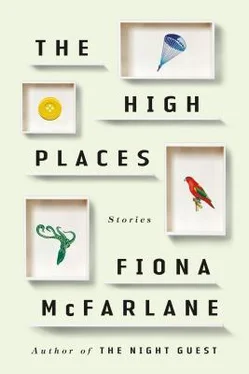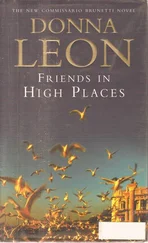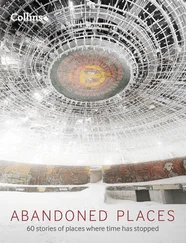‘What happened?’ asked Christopher, because Mr Kidd was very still on the bed and seemed to expect it. The vacuum sounds had stopped. Christopher noticed the rising of a sour smell from somewhere in the room, which might have been drain or birdcage or something worse.
‘It hopped right in and played with the seeds all right, but it didn’t eat them. It washed itself in the water dish, but it didn’t drink a drop.’
The bird on the wardrobe puffed out its chest.
‘And that was twenty years ago,’ said Mr Kidd. ‘It’s never eaten a bite or sung a note. Never even dropped a feather. That bird, my friend, is over a hundred and fifty years old.’
He slapped his knees and shook his head; these were gestures of such pride and pleasure, and they suggested such cheerful submission to the surprises of life, such joy at having been wrong, that Christopher was tempted, for a moment, to believe Mr Kidd, to believe the bird as it twitched on the wardrobe, to walk through the lobby and out into the unknown city looking at everyone he passed, to believe in them, to find some steadfast one to love and trust, to burn with something — anything — in the bright, blank holiday afternoon.
The bird flew down from the wardrobe and onto Mr Kidd’s shoulder. It beaked his beard. It ticked and trembled. Christopher wanted to touch it.
‘What’s it made of?’ he asked.
‘You’re the expert,’ said Mr Kidd. ‘You tell me.’
Christopher stood and stepped close. He held out a finger; the bird, quizzical, looked at it. He touched the bird’s back and felt ridged softness.
‘Feathers,’ he said.
Mr Kidd nodded. ‘I figured as much,’ he said. ‘But how’re they fixed in?’
‘If I could look —’ said Christopher, but Mr Kidd jumped and the bird, too, jumped, and flew back into its cage, because the pile of magazines on which Christopher had been sitting had collapsed from the chair and slid onto the floor, and over them skated his photocopied pages of waxwork women, disembowelled.
‘Funny sort of line you’re in, Chris,’ said Mr Kidd, but he seemed unfazed; he had followed the bird to its cage and closed the door.
‘You get used to it,’ said Christopher, gathering the magazines.
‘Leave it, leave it,’ said Mr Kidd, and when Christopher looked up he saw the cage swinging before his face. ‘Now, I’ve never been game, but you’re a professional. How’s this: I give you the bird for a day or two and you take it apart, you figure out how it works and you put it back together exactly as it was. You can write it all up for your thesis — fair’s fair.’
Mr Kidd held the cage at arm’s length from his body. His hand shook, and the cage, and the bird inside it. The cage was clean, except for scattered seed. A small bell rang beneath the tiny mirror. Mr Kidd shone above his offering. The bird said, ‘Violet! Violet!’ and Mr Kidd closed his eyes for a moment; his face when he opened them was both happy and grave.
‘You want me to … open this bird?’ asked Christopher.
‘You’ve got the experience,’ said Mr Kidd, nodding at the photocopies in Christopher’s hand.
It occurred to Christopher that he could accept the cage, as Mr Kidd suggested, keep it for a night or two, and return it with a theory of a thousand moving parts. He could, in this time, watch the bird shit in the crumbs of its shucked seeds. This would be the kind, the generous thing to do. He took the cage from Mr Kidd, who dusted his hands as if free of a beloved burden.
‘This is nice of you,’ said Christopher.
‘I’ve waited a lifetime,’ said Mr Kidd, and Christopher nodded, said goodbye, entered his own room — vacuumed, apparently — and placed the cage on the writing desk.
He spent the afternoon reading at the desk; the bird stood on its perch and appeared to watch him. It neither ate nor drank, and it didn’t speak, although Christopher looked up from his work at intervals and said, ‘Hello? Hello?’ The pigeons vibrated in the eaves.
When Christopher went out to buy a kebab for dinner, he saw the people of the city drinking and walking and eating together. Even those alone in the streets had some purpose: they hurried toward a beloved, an appointment; they were on their way to a house, an intimate room, they would enter the room and be unfastened. The lounge of the St George Hotel flickered at the corner of his eye as he crossed the lobby. He climbed the stairs to his floor. Fifth floor. He pulled some chicken from the kebab and offered it to the bird, which inspected and refused it. For hours he sat by the cage composing an anatomy for the bird — rubber hoses, bellows, wires, tiny gears and springs, silk feathers — he was absorbed in this work as he no longer was in his thesis. Mr Kidd, from next door, contributed his serial cough.
If it would just unleash a torrent of shit, thought Christopher. If it would just sing. It was so imperfectly a bird without the shit and the song. He covered the cage with a towel before going to bed, where he lay for some time, tucked into scrawny sheets, listening to passing feet in the corridor for evidence of drunkenness or injury. He slept until he was startled awake by the sound of buses as they took their nocturnal route through that part of the city. His mind had continued to work during sleep; he now saw a diagram of the inner bird, polished and bronze, and the bird itself opened out like a doll’s house. The economy of the design delighted him. To have fitted all that inside such a tiny object! To create such a masterpiece in order to conceal it!
He went to the desk and began to draw; this drawing came so easily, and each minute part of it was the source of such serious pleasure for Christopher, that he grew anxious. A suspicion rose each time he heard Mr Kidd’s cough through the flimsy walls: that all this, the bird, Mr Kidd’s request, this beautiful, careful task, was a kind of joke, played upon him because he had slighted Mr Kidd in the hotel lounge that morning. It became clearer, as the night persisted and he continued to draw, that Christopher had been arranged, somehow, for sacrifice, and the bird along with him, so that Mr Kidd might walk freely through the lobby and into the lounge; might remain on first-name terms with Lori, the maid; might still be permitted to approach newcomers and startle them with his friendliness; might do all this under the watchful eye of the other men of the St George Hotel.
The bird rustled under its towel; Christopher uncovered it. It moved the waxen fingernail of its beak without producing any noise, and the lamplight lit its glassy eye.
‘Hello, hello,’ said Christopher, opening the cage.
The bird jumped down to the desk and onto Christopher’s arm. It throbbed there, motionless.
‘Hello, hello,’ said Christopher, rubbing its tidy head, feeling the spidery weight of its claws. It was so living, there on his arm, so compact, so close: the strangest thing he had ever seen, blue and yellow and white and black; a sidling, a sitting, a lifting of the wing.
The bird remained on Christopher’s arm as he gathered his slippers and papers, his third of a wardrobe’s worth of clothes, and packed them into his suitcase. To perform these tasks one-handed gave them a steady grace. In order to change into his daytime clothes, he placed the bird on the end of the bed where the sheets were tucked so tightly his feet hadn’t creased them. When he was dressed, he took the bird and wrapped it in the folds of his pyjama shirt. He placed this bundle of bird and shirt in the suitcase, which he closed and locked.
The hallways of the St George Hotel were quiet; there was no one to see Christopher slide his diagram beneath Mr Kidd’s door. The stairwell was empty. The clerk at Reception seemed used to the furtive departure of paying guests. The St George, as Christopher left it, felt collegial to him, and he loved its tender, threadbare enterprise. Outside, the streets lived their constant life, but the men of the hotel were safe within, with their lukewarm lounge and their curtain-lit rooms. Mr Kidd would stir into this morning just beginning, and the pigeons at his window would lull and soothe him. The sky to the east was lightening into colour. ‘Violet, Violet,’ said Christopher, and he stepped with purpose into the street. He became, then, any traveller on his intimate way through the early city, groomed for the street and taking care not to bump his suitcase.
Читать дальше












